Yaohui Zhang
From Replication to Redesign: Exploring Pairwise Comparisons for LLM-Based Peer Review
Jun 12, 2025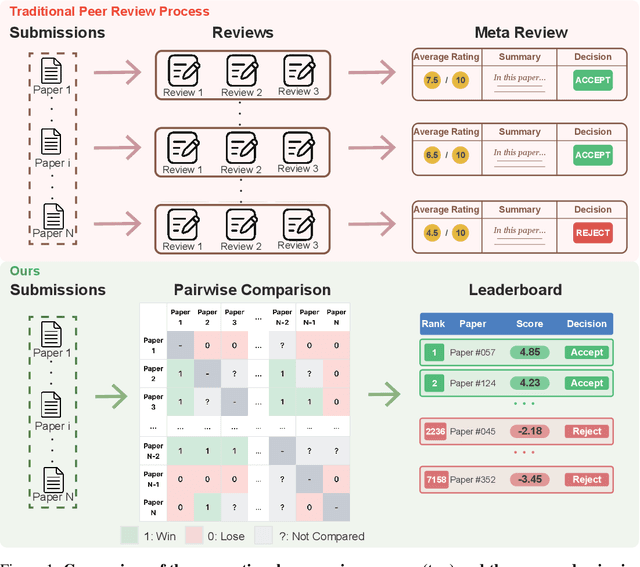

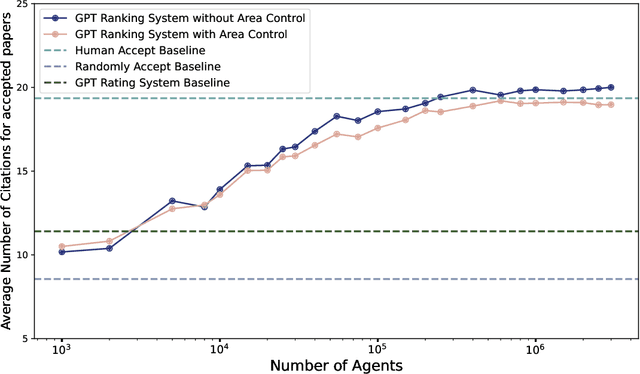
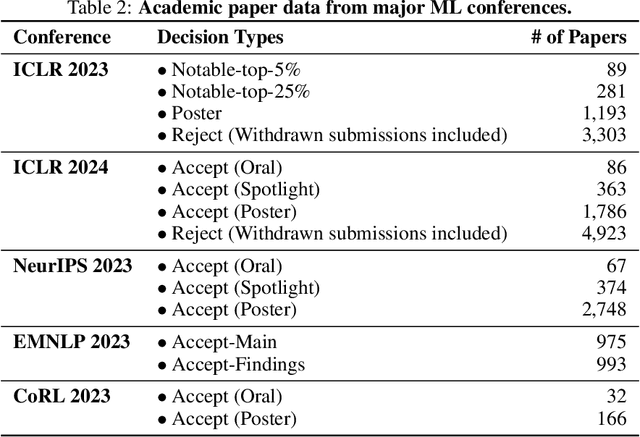
Abstract:The advent of large language models (LLMs) offers unprecedented opportunities to reimagine peer review beyond the constraints of traditional workflows. Despite these opportunities, prior efforts have largely focused on replicating traditional review workflows with LLMs serving as direct substitutes for human reviewers, while limited attention has been given to exploring new paradigms that fundamentally rethink how LLMs can participate in the academic review process. In this paper, we introduce and explore a novel mechanism that employs LLM agents to perform pairwise comparisons among manuscripts instead of individual scoring. By aggregating outcomes from substantial pairwise evaluations, this approach enables a more accurate and robust measure of relative manuscript quality. Our experiments demonstrate that this comparative approach significantly outperforms traditional rating-based methods in identifying high-impact papers. However, our analysis also reveals emergent biases in the selection process, notably a reduced novelty in research topics and an increased institutional imbalance. These findings highlight both the transformative potential of rethinking peer review with LLMs and critical challenges that future systems must address to ensure equity and diversity.
Mapping the Increasing Use of LLMs in Scientific Papers
Apr 01, 2024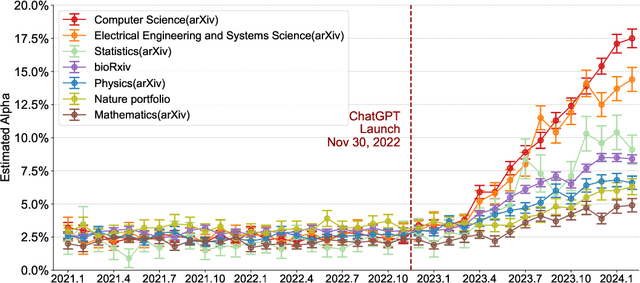
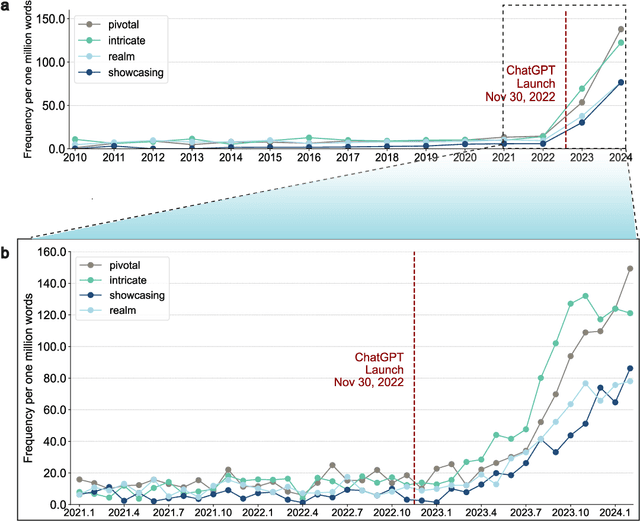
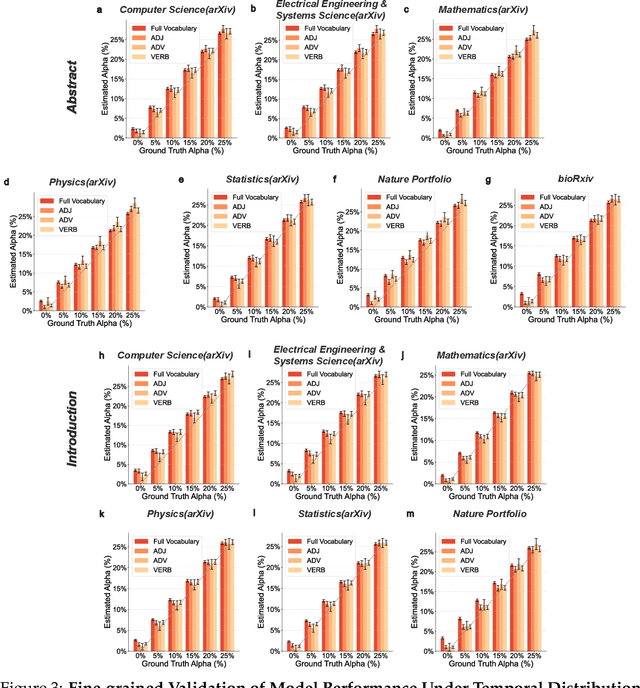
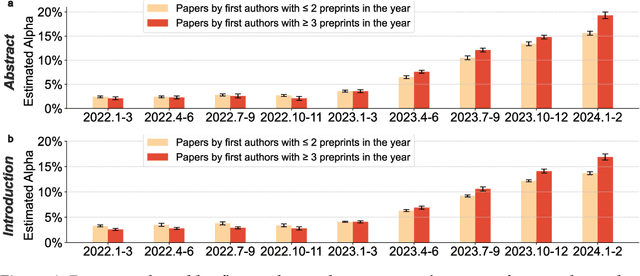
Abstract:Scientific publishing lays the foundation of science by disseminating research findings, fostering collaboration, encouraging reproducibility, and ensuring that scientific knowledge is accessible, verifiable, and built upon over time. Recently, there has been immense speculation about how many people are using large language models (LLMs) like ChatGPT in their academic writing, and to what extent this tool might have an effect on global scientific practices. However, we lack a precise measure of the proportion of academic writing substantially modified or produced by LLMs. To address this gap, we conduct the first systematic, large-scale analysis across 950,965 papers published between January 2020 and February 2024 on the arXiv, bioRxiv, and Nature portfolio journals, using a population-level statistical framework to measure the prevalence of LLM-modified content over time. Our statistical estimation operates on the corpus level and is more robust than inference on individual instances. Our findings reveal a steady increase in LLM usage, with the largest and fastest growth observed in Computer Science papers (up to 17.5%). In comparison, Mathematics papers and the Nature portfolio showed the least LLM modification (up to 6.3%). Moreover, at an aggregate level, our analysis reveals that higher levels of LLM-modification are associated with papers whose first authors post preprints more frequently, papers in more crowded research areas, and papers of shorter lengths. Our findings suggests that LLMs are being broadly used in scientific writings.
Monitoring AI-Modified Content at Scale: A Case Study on the Impact of ChatGPT on AI Conference Peer Reviews
Mar 11, 2024



Abstract:We present an approach for estimating the fraction of text in a large corpus which is likely to be substantially modified or produced by a large language model (LLM). Our maximum likelihood model leverages expert-written and AI-generated reference texts to accurately and efficiently examine real-world LLM-use at the corpus level. We apply this approach to a case study of scientific peer review in AI conferences that took place after the release of ChatGPT: ICLR 2024, NeurIPS 2023, CoRL 2023 and EMNLP 2023. Our results suggest that between 6.5% and 16.9% of text submitted as peer reviews to these conferences could have been substantially modified by LLMs, i.e. beyond spell-checking or minor writing updates. The circumstances in which generated text occurs offer insight into user behavior: the estimated fraction of LLM-generated text is higher in reviews which report lower confidence, were submitted close to the deadline, and from reviewers who are less likely to respond to author rebuttals. We also observe corpus-level trends in generated text which may be too subtle to detect at the individual level, and discuss the implications of such trends on peer review. We call for future interdisciplinary work to examine how LLM use is changing our information and knowledge practices.
 Add to Chrome
Add to Chrome Add to Firefox
Add to Firefox Add to Edge
Add to Edge